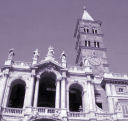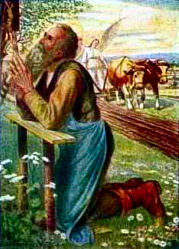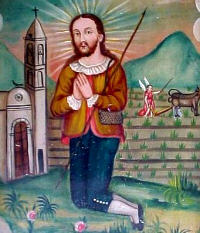Easter: May 15th
Monday of the Sixth Week of Easter; Optional Memorial of St. Isidore (USA); Minor Rogation Day
» Enjoy our Liturgical Seasons series of e-books!
The diocese of the US celebrate the Optional Memorial of St. Isidore the Farmer (1070-1130). He was a Spanish laborer who worked most of his life as a ploughman for a nobleman who lived near Madrid, Spain. Although working many hours a day, he never failed to attend daily Mass, and spend time praying before the Holy Eucharist. He married a maid-servant, Maria de la Cabeza, who was also canonized a saint. They were always willing to help their neighbors and worked with the poor in the city slums. In 1947, he was proclaimed the Patron of the National Rural Life Conference in the United States.
Today marks the beginning of the Minor or Lesser Rogation Days, which fall Monday through Wednesday preceding Ascension Thursday.
Minor Rogation Days
Monday, Tuesday and Wednesday of this week we commemorate the traditional dates for the Minor Rogation Days. These are days of prayer and formerly fasting, which take place every year on April 25th and the three days preceding the feast of the Ascension, the former being known as the Major Rogation and the latter as the Minor Rogations. The word “rogation” has its origins in the Latin word rogare, which means to supplicate or ask, and the purpose of Rogation Days is to beg God for His mercy, to turn away His anger, and to ask Him to bless the fruits of the earth while protecting us from natural disasters. The Rogation Days no longer appear on the General Roman Calendar, but celebrated according to the local conference of bishops.
The celebration of Rogation Days consists in a procession followed by the Rogation Mass. In this procession we may sense the last remnant of the obsolete station processions observed by ancient Christians almost daily during Lent and during the first week after Easter. They would gather in a church known as the ecclesia collecta (hence the word "Collect") and from there walk in procession with the bishop and clergy to another church singing the Litany of the Saints and the Kyrie. The place of destination was known as the station or station church, and holy Mass was celebrated there.
Our present Rogation liturgy has preserved something of these venerable practices. Our prayer should not only be sincere and personal, we should also pray as units of a community, for to this type of prayer a special efficacy is attached. In the Rogation procession the Litany of the Saints is recited; it gives us an opportunity to call upon the entire Church triumphant to intercede in our behalf. The prayers concluding the Litany are usually beautiful and edifying.
What petitions will surely be answered? Those which, according to christ's words, are made in "the right spirit," and which are offered in the Name of Jesus, I.e., tend to further the kingdom of God. In the "Our Father" Christ has given us a summary of such petitions. Therefore, if our wishes are similar to those in the Lord's Prayer, we can assume that they will be heard. These petitions fall under three hoarding: God's kingdom, daily food, sin. God will certainly grant petitions of this kind.
a) God's kingdom. For this purpose Christ came to earth. Prayers to further God's sovereignty within us or about us are petitions of Christ Himself. Their object is that we may give greater glory to God with heart and tongue, in deed and action; that we may become and remain God's children; that the mystical Body may grown in numbers and in virtue; that worthy priests may be found; in short, that God's kingdom on earth may prosper in every way. To know the will of God and do it, to see God's Providence in the course of human affairs, are petitions which will certainly be fulfilled and which will open the floodgates of grace. In these matters let us resemble the importunate friend and the confident child in the Gospel parable.
b) Daily Bread. Do not that that all your petitions must be for spiritual and supernatural benefits. God wishes to relieve earthly needs, provided these are to our spiritual advantage. Yes, we may, we should pray for earthly goods; and our prayers will undoubtedly be heard even though the answer may not always be identical with our desire. Among such petitions are the following: that God spare us from unemployment; that we may be able to supply our needs in the matter of clothing, nourishment, housing; that we enjoy good health, be granted a bountiful harvest, be preserved from pestilence, famine, and war. Our prayer will certainly be heard, even though God's answer at times may be on a higher level. And when God does not answer the petition, He certainly gives the strength and grace to accept His holy Will.
c) Sin. Now we come to a petition, forgiveness of sin, the always is heard, and here there are no restrictions. We must, of course, make it a genuine prayer, "forgive us as we forgive those who trespass against us"; otherwise our "prayer may be hindered" (1 Pet. 3:7). "Lead us not into temptation." God will never permit anyone to be tempted beyond his strength. If we ask, He will give the grace to overcome the tempter. It is ten for granted that will not place ourselves int eh occasion of sin. "Deliver us from evil." This petition God will surely grant as life ebbs to an end. And once the victory is won, we will experience no tears, no lamenting, no suffering, no evil—in heaven.
—Excerpted from The Church's Year of Grace, Pius Parsch
Highlights and Things to Do:
- Rogation Days: Cross Days (Activity)
- Rogation Day Prayers (Prayer)
- Read more about the Rogation Days at Catholic Saints Info.
- For more see Rogation Days.
 Monday of the Sixth Week of Easter, Monday of the Lesser Rogation Days
Monday of the Sixth Week of Easter, Monday of the Lesser Rogation Days
Station with Santa Maria Maggiore (St. Mary Major):
Following the disasters that afflicted the diocese of Vienne in Daughphiny in the fifth century, St. Mamertus instituted a solemn penitential procession on three days preceding Ascension Day. In 511 the Council of Orleans ordered it for the rest of France. It soon spread to the whole Church. The Rogation Days, though they remain an occasion for imploring God's blessing on the whole life of the Church, have in our days become a time of prayer for Him to bless the year's harvest. The singing of the Litany of the Saints has given its name to these three days of public intercession, but as at Rome there was already a similar procession on April 25, the Rogation Days came to be called the Lesser Litanies. The bishop may appoint another date for the Rogation Days, if it better meets local needs or customs.
For more on Santa Maria Maggiore, see:
For further information on the Station Churches, see The Stational Church.
St. Isidore the Farmer
 When he was barely old enough to wield a hoe, Isidore entered the service of John de Vergas, a wealthy landowner from Madrid, and worked faithfully on his estate outside the city for the rest of his life. He married a young woman as simple and upright as himself who also became a saint-Maria de la Cabeza. They had one son, who died as a child.
When he was barely old enough to wield a hoe, Isidore entered the service of John de Vergas, a wealthy landowner from Madrid, and worked faithfully on his estate outside the city for the rest of his life. He married a young woman as simple and upright as himself who also became a saint-Maria de la Cabeza. They had one son, who died as a child.
Isidore had deep religious instincts. He rose early in the morning to go to church and spent many a holiday devoutly visiting the churches of Madrid and surrounding areas. All day long, as he walked behind the plow, he communed with God. His devotion, one might say, became a problem, for his fellow workers sometimes complained that he often showed up late because of lingering in church too long.
He was known for his love of the poor, and there are accounts of Isidore's supplying them miraculously with food. He had a great concern for the proper treatment of animals.
He died May 15, 1130, and was declared a saint in 1622 with Ignatius of Loyola, Francis Xavier, Teresa of Avila and Philip Neri. Together, the group is known in Spain as "the five saints."
Patronage: against the death of children; agricultural workers; day laborers; farm workers; farmers; field hands; for rain; husbandmen; laborers; livestock; Mexican peasants; ranchers; Spanish peasants; rural communities; Farmers; farm workers; ranchers; rural communities; National Catholic Rural Life Conference in the United States.
See CatholicSaints.info for a full listing of organizations and locations that claim St. Isidore as patron.
Symbols and Representation: White oxen; spade; hoe or rake; plough
Highlights and Things to Do:
- St. Isidore (and his wife Maria) are the patrons of the Catholic Rural Life Conference. Read this reflection on St. Isidore, their patron, some ideas to celebrate his feast and Novena to St. Isidore.
- Learn more about St. Isidore the Farmer:
- See Christian Iconography for some images of St. Isidore.
- The remains of St. Isidore Hand his wife Santa María de la Cabeza are located in Church of San Isidro in Madrid.
- Establishing or replenishing a a Mary garden would be an appropriate way to celebrate the combination of the feast of St. Isidore and the month of May, dedicated to Mary.
- Visit mgardens.org to learn more about Mary Gardens.
- There is also a lovely book on Mary gardens printed by St. Anthony Messenger Press called Mary's Flowers: Gardens, Legends and Meditations by Vincenzina Krymow.
- Visit Stokes Marys Gardens.
- Another book by Vincenzina Krymow is Healing Plants of the Bible which explains Biblical gardens and plants.
Two books we especially recommend: Cooking for Christ by Florence Berger (although we prefer the original 1949 edition; this is an edited version), and Rural Life Celebration Guide.






